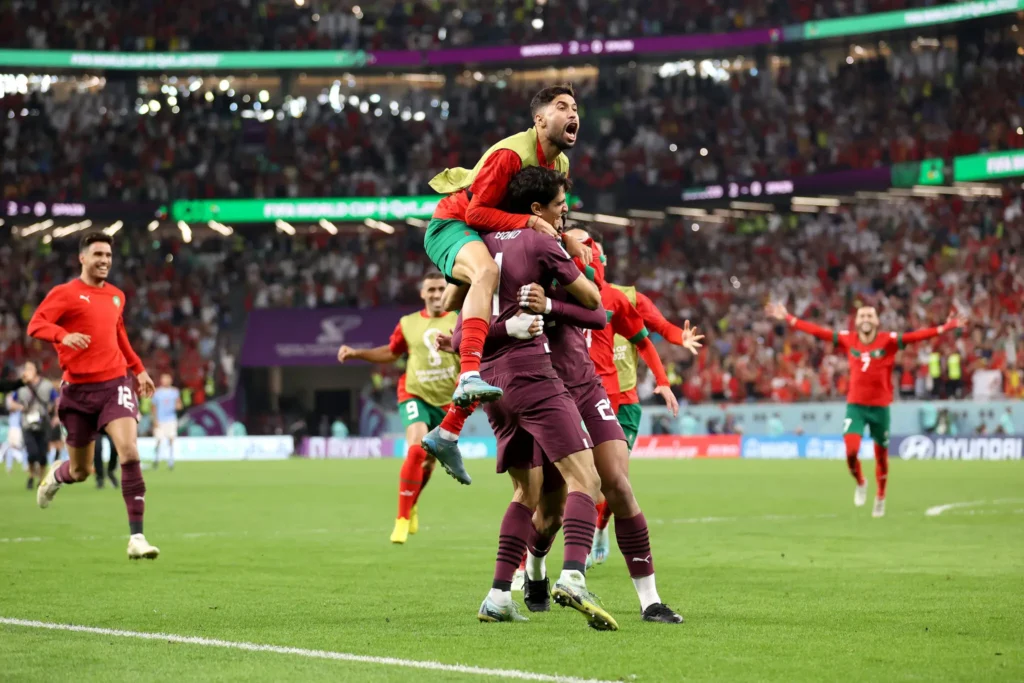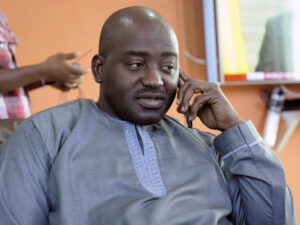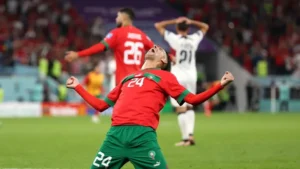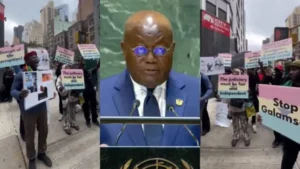
AL-RAYYAN, Qatar — For two hours, the noise had been building. It had started out at incessant and gone from there, passing by ear-splitting and head-spinning until it leveled out at somewhere beyond deafening. The constant, percussive roar seemed to emanate not so much from the tens of thousands of Morocco fans inside the Education City Stadium on Tuesday, but from the concrete and steel itself.
Achraf Hakimi walked into that wall of sound, his head bowed, as though all of the noise and all of the tension was bearing down upon him. He would take the penalty that could not only end Spain’s stay in Qatar, eliminating one of the tournament favorites, but that could take Morocco to its first World Cup quarterfinal.
The noise rose another octave. The pressure dropped another bar.
And then Hakimi — who was born in Spain, raised in Spain and might have played for Spain — stepped forward and, with a slight, deft touch of the ball, nothing more than a brush of silk, gently stroked his penalty past Unai Simón, a moment of utmost calm before unbridled chaos descended.
On the field, Morocco’s players sprinted to Hakimi, all of the weariness, all of the fatigue sustained over the course of a long, arduous evening now forgotten. In the stands, Morocco’s fans poured over each other, desperately reaching out to the players in gratitude, in ecstasy, in disbelief.
Morocco’s players had, as the striker Walid Cheddira said after the game, achieved “something historic†for the country. It was not just that Morocco had never been past the last 16 of the World Cup; it
was that no North African country, no Arab country, had. And now it had broken that ceiling here, at the first Arab World Cup.
The sense of solidarity among all of the teams from what is broadly, and a little indelicately, called the “Arab world†has been one of the most striking aspects of the first couple of weeks of this tournament in Qatar.
It runs deeper than the choreographed political gestures — the emir of Qatar sitting next to Mohammed bin Salman, the Saudi crown prince, at the opening game, and donning a Saudi Arabian scarf a few days later — staged for diplomatic purposes in the stadiums’ V.I.P. areas.
On the streets of Doha, Tunisian fans greeted Morocco’s group
phase successes with sincere glee, and vice versa; Saudi Arabia’s shocking win against Argentina prompted genuine celebration not just in Riyadh, the Saudi capital, but in Cairo and Amman and Beirut, too.
That sense of unified purpose has bled down to the players; there has been a feeling, among Morocco’s squad — a substantial portion of which was, like Hakimi, born and raised in Europe — that it is representing the region as a whole, not just its little part of it. “Thanks to all the Moroccans all over the world for your support,†the winger Sofiane Boufal said after the game. “To all Arab people, to all Muslim people. This win belongs to you.â€
It had felt, over the last few days, as though this tournament had dispensed with the frivolity of youth. The group phase is for fun, after all — Argentina’s defeat to the Saudis, Japan stunning Germany and Spain, and Australia overcoming Denmark — but the knockout rounds are for business.
The Netherlands made short work of the United States. Argentina coasted past an overmatched Australia. France, England, Croatia and Brazil had no time for romance, either. One by one, the surprise packages were breezily and summarily dismissed, and the old order re-established.
As it turned out, one final sting in the tail was still lurking. Spain started this World Cup with a seven-goal rout of Costa Rica, an irresistible, imperious display that seemed to serve as a warning to the rest of the field. Since then, though, that performance had
started to take on the distinct air of a false alarm.
Spain’s problem does not require any particularly complex analysis or an in-depth knowledge of tactics and systems to understand. Spain dominates games but does not score goals. Not enough goals, anyway. Not the number of goals that its technical ability, its aesthetic appeal and its stylistic sophistication warrant. Against Germany and Japan, it was exposed: held to a draw by the former, beaten by two quick-fire sucker punches by the latter.
And against Morocco, it was made to pay. Coach Walid Regragui’s team has now played four games in this World Cup — a total of 390 minutes — and it has not conceded a single goal to an opposition player. (The one goal it has allowed, against Canada, was self-inflicted.) That not only includes a period of extra time against Spain but also, remarkably, encompasses a penalty shootout, too.
In open play, Morocco held the Spanish at bay with a practiced expertise. Luis Enrique’s team threatened only fleetingly: a chance for Ãlvaro Morata here, a Dani Olmo free kick there, Pablo Sarabia clipping the post with what proved to be the final kick before penalties. Much of the time, though, there was simply no way through the unmoving, unyielding Moroccan back line; every time Spain believed it saw a glimpse of an opening, a leg or a head or a chest appeared to turn the danger away.
Perhaps the greatest testament to Morocco’s obduracy came late in normal time, when Rodri — a central midfielder being deployed as a central defender — strode forward and shot, more in hope than in expectation, from 35 yards. Regragui’s team should have taken it as a compliment. In Spanish eyes, that is as good as an admission of defeat.
Penalties had looked like Spain’s best chance of progress for some time; the better of the scant chances that there had been, after all, had fallen to Morocco. If anything, though, Spain’s defect was even more apparent from 12 yards.
Sarabia, introduced with the express purpose of taking a penalty, missed the first kick. Carlos Soler scuffed the second. Sergio Busquets, one of the last remaining links to that team from a lifetime ago that won the World Cup, strolled up to take the third.
He looked, as he always does, entirely unruffled, a picture of absolute confidence. He missed, too.
At every turn, the drums beat a little harder, the roar grew a little louder, an overwhelming, almost elemental sound. Hakimi walked forward. He paused, took a breath. And then he chipped his penalty, soft and unerring, past Simón. As the ball landed in the net, it turned out the noise was only just getting started.






